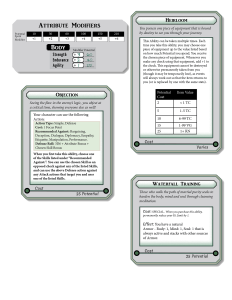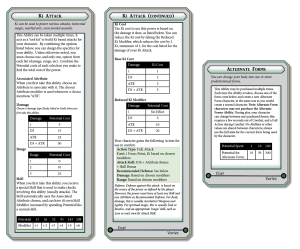Today we’ll take a look at character building content in Mysteries of the Yokai. With our Kickstarter campaign about to start, it’s been a busy last few months for us, and one of the things always on our mind is the state of game content. We’ve had several playtests lately, and talked with many players about character creation. You’ve given us lots of great feedback, and we hope those of you who’ve played, or even just flipped through our books, like what you see so far.
Combining Pieces
We’re now finishing up the second stage of balancing the game, which involves checking how the various abilities interact in play. The first stage we went through was to stabilize the main game rules; this kept us from having to re-test all the abilities if the way the overall rules work changed. When you build systems this big, you can never really lock something in completely until the final book, but you do as much as you can of the foundation upfront. For example, we knew the game would have “buffs and debuffs”, so we needed a rule for how those could be applied to and removed from characters before we started building what they actually did. If the rules for that weren’t already in place, we would have to go back and hack up the main gameplay to fit them in later.
The early parts of the second stage were to assign Potential costs to abilities and attempt to find the highs and lows we were looking for. If you’ve read through our books, you’ll see some awkward math; increments of 11 or 13 to level up Skills, Kata costs not in increments of 5, etc. The goal at this stage is to find out what things are worth in relation to each other, so we need these strange numbers to have a good range we can modify by. By turning the knobs up and down on these, we can slowly figure out if 40 points of Ability A is roughly equal to 40 points of Ability B. Of course, in a system as flexible as Mysteries of the Yokai, “roughly equal” does end up being pretty rough after all. How can you compare the ability to haggle for a good price for room and board with the ability to change into a bird, or channel your Ki into your fist and break stone? That question has driven the focus of a lot of our playtesting.

|
(Where do you want to spend your last 25 Potential? Round up those Attributes to increase their modifiers? Train under a waterfall for permanent armor? Be a famous legal defendant that always knows when the facts will save your client? Maybe you want to have a treasured master-crafted blade to see you through your journey?) |
We have a pretty good idea of what’s useful in common situations in the world of Yokai, and what might be fairly rare. We build this value system around the world lore, the way the game mechanics make use of abilities (for example, how much Tide damage can be inflicted), and our own experiences with a full range of game systems (from the most social, handy-wave rules light slice-of-life games to the heaviest math-hammer grognard dungeon hacks, between the team here we’ve played and loved any kind of game you can imagine).
That said, we also know that every playgroup is different. We balance most abilities around a rough estimate of 30% exploration, 30% social interaction, 30% conflict (physical or not), and 10% genre specific material. This material will vary with whatever you plan to do with your game. Want to set Mysteries of the Yokai in the near-future and play a cyberpunk world? Maybe you’d rather break out the Space Opera and do Mecha of the Yokai? Obviously things like this will shift what abilities are useful (or even available) to players. We have to bake in a bit of a buffer in both directions so that those edge case abilities don’t end up costing too much for players that want them in situations where they’re not useful all the time, while still not being too cheap if they would be constantly useful. We do this so that GMs don’t need to do their own complete re-pricing if they stray out of the lore in the book (though they can if they want to, of course).
A good example of this is the Languages skill. Some GMs will bypass the language barrier completely (or have a ‘universal language’ trope), rarely having a need for more than the main languages. Others may want to break Japanese into regional dialects and have scenes where the party ends up in the wrong place due to that Kamigata (the Edo equivalent of the ‘Osaka accent’) drawl the innkeeper had when giving them directions.
So, bringing the discussion back to where we are, ability wise, we’ve got a solid rules framework and are now expanding which Abilities are available in our example books for playtesting. If you’ve been checking the books for a while, you may remember we started with mostly direct combat abilities and some divine magic. Abilities that affect your stats (like increasing Morale Threshold) and provide armor or modify rolls (like Protective Circle and Fortune’s Favor) were our starting ground. We used them to get a baseline for what combat related abilities were worth when compared to Skills.
Now that we have a good handle on our Ki System, we’ve been adding a lot more Ki based abilities. We’ve also added some abilities vital to the Yokai genre, such as Shapeshifting, Illusions, and Ki Attacks. On top of that, we’ve got the first of the ‘social’ abilities, that bridge the gap between resolving social encounters with single Skill rolls and using the Tide System for more complex encounters. Finally, we’ve got the first pass on equipment and economy in the book now, letting you buy and sell things, or even spend Potential to have an Heirloom weapon, or carry a variety of tools so you’re ready for any situation.
Recently added Abilities
- Shapeshifting and Illusions: These abilities let a character build alternate character sheets, create illusions to trick other characters, alter their Attribute modifiers, or just be like that guy from Labyrinth and turn into a bird.
- Ki Abilities: Now that Ki has been locked in, we have a flexible system to build your own Ki Powers. We don’t use specific spells like Firebolt or Lightning Ball, instead you build an Ability by paying for modifiers like damage, range and your skill when attack. This means you can have anything from a bolt of magical energy to the Ki-infused punch of a martial artist.
- Social Abilities: Mysteries of the Yokai blends skills, attacks and other abilities, so that you can use anything that makes sense to inflict Tide damage. In a debate, you could do damage with Etiquette to imply your opponent is a barbarian, or use Investigation to point out the flaws in their argument. On top of the basic game mechanics, we want to have a large group of special abilities for affecting non-physical combats that do the same kind of fun things you would do in a sword fight, but in a debate or investigation. We’re starting to roll out some examples of these to test how much they need to stray from the combat mold.
- Equipment: We’ve added the first pass of buying equipment, weapons and armor, and special abilities related to gear. At this point, values are VERY rough, as we’re still in the early part of phase 2 here, finding the highs and lows we want. We’re also working on balancing the economies of rice (the unit of currency) with Potential (the points a player buys abilities for their character with).
|
(Some examples of newly added Abilities. Ki Attack lets you build your own ‘spells’, and Alternate Forms lets you create other character sheets to shift into during the game.) |
We love hearing from players on which abilities are the most exciting to them. Have something you want to see in the game? Feel free to let us know! We have dozens of abilities that aren’t yet in the example books, but we’d hate to miss something you would want to play with because we haven’t thought of it yet. Drop us a line at feedback@wardingcircle.com, or if you feel the urge to drum up grassroots support for your favorite power or technique, and you’re planning to back our Kickstarter, you can hop on the comments section and tell us, and other backers, all about your grand vision.
We’ll be on Kickstarter Thursday January 27th 2016 so don’t forget to check out our campaign!

